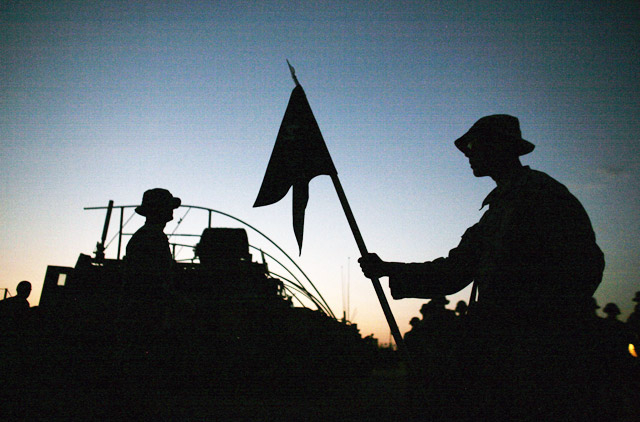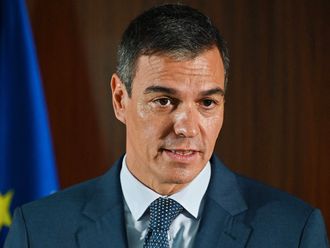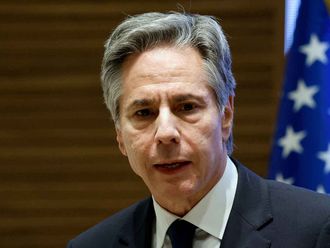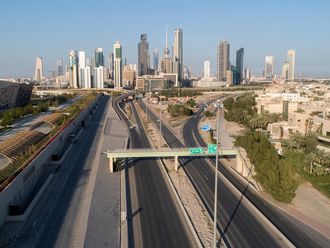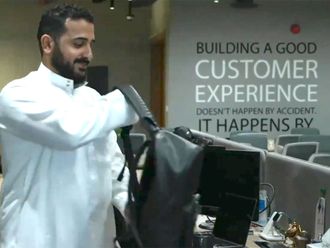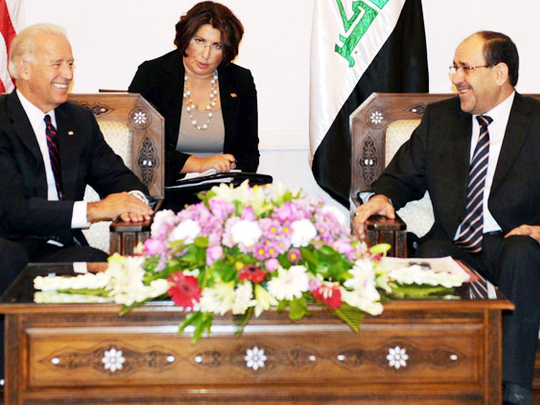
Baghdad: Prime Minister Nouri Al Maliki told Iraqis on Tuesday their own soldiers and police are up to the job in an "independent" state as US forces ended a combat role after seven years of warfare.
"This is a day that will remain in the memory of all Iraqis. Today, Iraq has become a sovereign and independent country," the prime minister said on state television.
"As of today, our security forces will play the leading role in maintaining the security and defence of our country," he said.
A major troop pullout over past months has left less than 50,000 US soldiers in Iraq while a simultaneous surge in car bombings and shootings, many targeting local security forces, has raised security concerns.
US President Barack Obama was to mark the symbolic end of combat operations in a speech from the Oval Office at 0000 GMT (3:00 am on Wednesday for Iraqis), after visiting a base in Texas to meet returned Iraq veterans.
He was also expected to speak by telephone with former president George W. Bush who, backed by key ally Britain, took the decision to invade Iraq in March 2003, ousting dictator Saddam Hussein within weeks.
In the television address to his people, Maliki said he was confident the last US forces would leave the country as planned at the end of 2011.
"I reassure you that the Iraqi security forces are capable of taking full responsibility," Maliki said. "Unfortunately we are facing a campaign of doubt."
US Vice President Joe Biden landed in Baghdad on Monday night to mark the American military's change of mission from combat to training and advisory tasks in support of Iraqi forces, starting from Wednesday.
He was due to meet President Jalal Talabani, Maliki and the former premier and March 7 election winner Iyad Allawi as well as other top politicians throughout Tuesday.
More than 4,400 US troops have died in Iraq since the invasion, a number dwarfed by the estimated 100,000 civilians who have been killed.
Iraqi citizens seem unconvinced that the official end of US combat operations would herald an improvement in security.
"The situation will get worse, especially as the withdrawal comes amid a political vacuum," said Salah Abu Al Qassim, 36, a trader in Shorja market in central Baghdad.
"If the politicians continue fighting on the chairs, the situation will get worse."
Biden's trip comes almost six months after a closely-fought general election that was followed by protracted coalition negotiations which have yet to usher in a new government, causing alarm in Washington.
Tony Blinken, Biden's National Security Adviser, said the current caretaker administration in Baghdad was not a "durable solution."
"There is some growing sense of urgency that government formation move forward, and certainly the vice president is going to urge the leaders to bring this process to a conclusion," Blinken told reporters.
Obama declared shortly after taking office last year that the US combat mission in Iraq would end on August 31, 2010, after which American troops would take on a training and advisory role prior to a complete withdrawal in 2011.
There are now 49,700 American soldiers in Iraq, less than a third of the peak figure of almost 170,000 during the US "surge" of 2007, when the country was in the throes of Shiite-Sunni carnage that cost tens of thousands of lives.
The outgoing commander of US forces in Iraq, General Ray Odierno, has said the new force strength will be maintained "through next summer" before troop numbers fall towards zero by the end of the December 2011 withdrawal deadline.
He told the New York Times on Monday that failure to form a new government could undermine Iraqis' faith in democratic rule.
"The longer that takes, the more frustrated they might get with the process itself," Odierno said.
Iraq's top army officer, Lieutenant General Babaker Zebari, warned on August 11 that a complete withdrawal of US troops at the end of next year would be premature, and urged a change of tack from the country's politicians.
"If I were asked about the withdrawal, I would say to politicians: the US army must stay until the Iraqi army is fully ready in 2020," the general told AFP.
Biden last visited Iraq in July when he urged politicians including Maliki and Allawi to resolve their differences, but there was no breakthrough.


